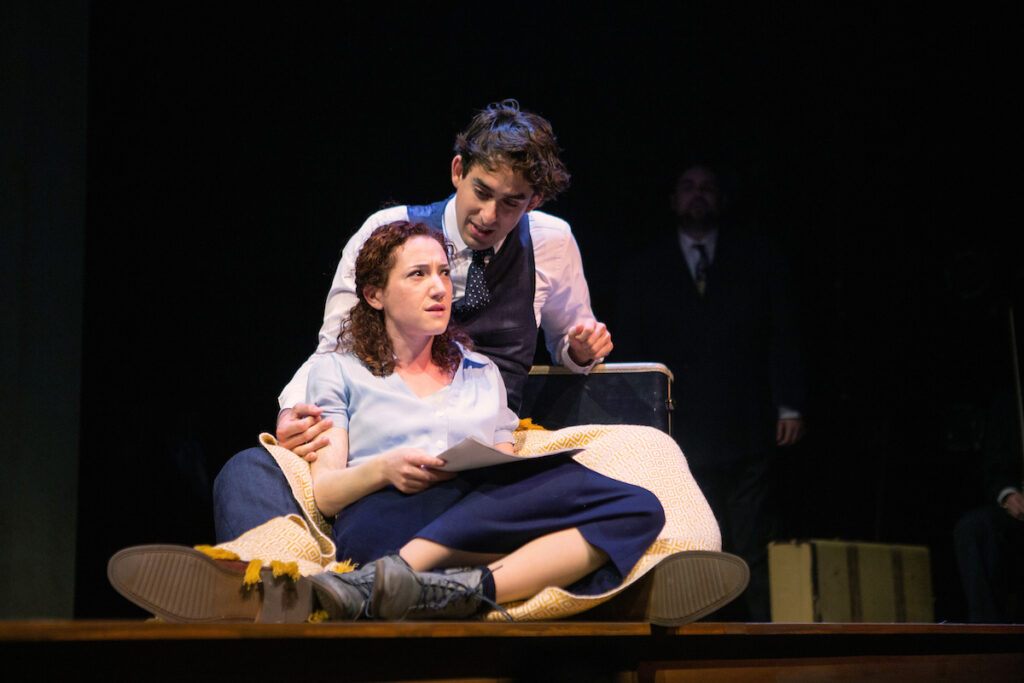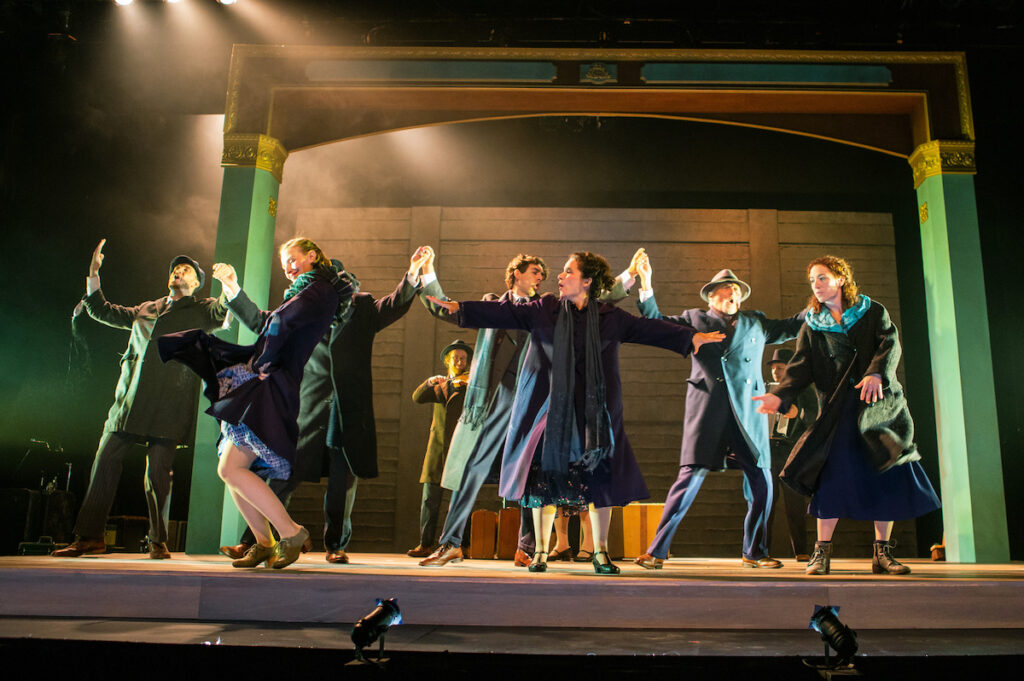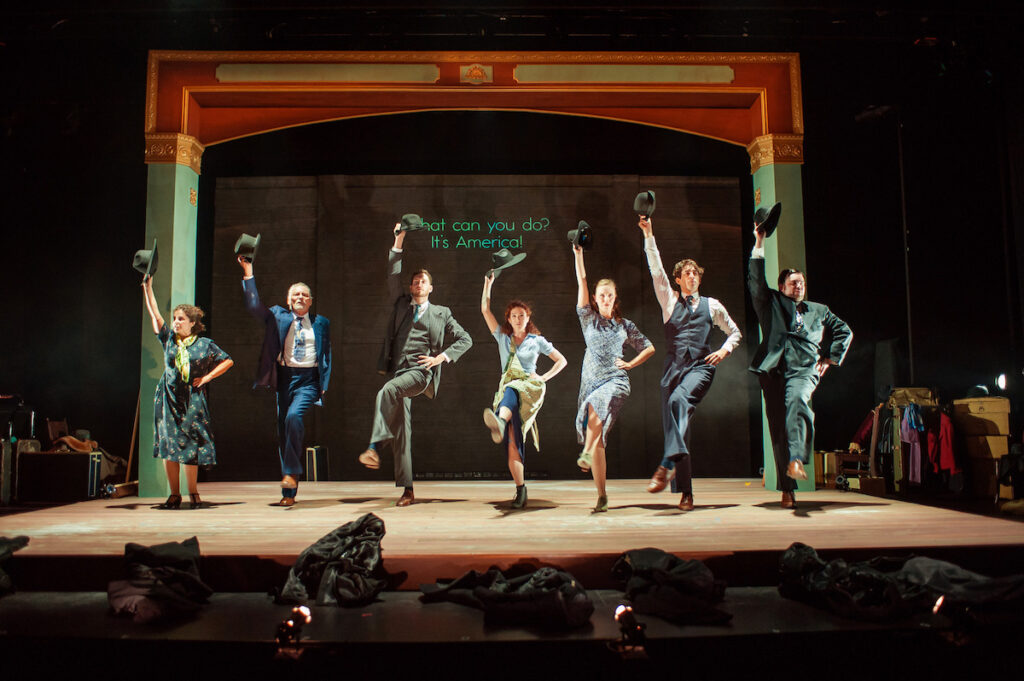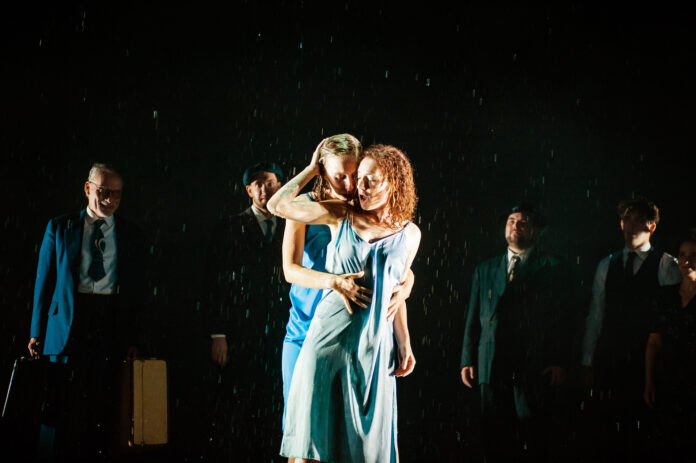There were two things that irked me ahead of the first show of SF Playhouse’s 20th season, both of which were relatively minor. The first was show director-executive director-co-founder Susi Damilano claiming that “we are gradually coming back from the pandemic,” especially when she and AD/co-founder Bill English were masked, and numbers show we’re in for another rough autumn-winter surge. The pandemic is very much not “over.” The second thing that irked me was an older, affluent woman in the row behind me: She never wore a mask and had a poodle in her lap the entire show. (Granted, the dog didn’t make a sound, but the combo of the dog and not-masking was very “walk amongst the peasants.”)
I mention these pet peeves at the offset because the opening night of Paula Vogel’s Indecent (through November 5 at SF Playhouse) was otherwise an enjoyable and safe night of theatre. “Safe” because, despite Poodle Woman, every other vax-checked patron kept their mask on and the CO² readings of my Aranet4 peaked at 562ppm, despite it being a packed house at a two-hour show with no intermission.
The joy came from Vogel’s script, Damilano’s direction, and the performances of her collaborators. Despite its heavy subject matter, Indecent is a celebration—of Judaism, theatre, and the intersection of the two. Vogel’s play is a somewhat meta-theatrical biography recounting Polish-Jewish author Sholem Asch (Billy Cohen) and the circumstances surrounding his controversial Yiddish-language play Got fun nekome (God of Vengeance).

The story is told via a small ensemble of seven actors and three musicians (using only acoustic instruments like violins and accordions), done in a manner reminiscent of classic “ethnic” theatre from the early 20th century. Richard Olmsted’s bare-bones set consists of only a station arch above a platform, with instruments and props on the far-right and -left. The upstage wall is brick, home to Sarah Phykitt’s projections.
From the beginning, Lemml (Dean Linnard) asks us to suspend our disbelief as he and his troupe portray countless characters across the 20th century. This is, he tells us, the story of “the play that changed my life.” But, despite the troupe staging the show every night, he claims he has no idea how it ends. Given all the variations the play in question will take, we can’t blame him.
Although Sholem’s wife Madje (Malka Wallick) is instantly won over after reading God of Vengeance—the 1906 tale of a Jewish brothel owner attempting to go legit and marry off his secretly lesbian daughter—not all of Asch’s fellow Jews are as welcoming. (Victor Talmadge briefly portrays I.L. Peretz, who infamously told Sholem to burn his manuscript.)

Yet, Asch does find a willing cast and crew for his script, touring all through Europe to ecstatic crowds. Eventually, the states come calling and by the 1920s, Asch is granted the opportunity to stage the play on Broadway. The problem is, the translated version will hardly be the play he wrote, and he himself begins to wonder what good his words are when his people are being slaughtered in Europe.
None of that description even covers the genuine romantic feelings developed by the actresses playing lovers (Rivka Borek and Malka Wallick), the dance numbers that signal scene transitions, or even the appearance of Eugene O’Neill. Vogel’s play packs quite a lot into its two hours of stage time, all of it guided by Lemml. The play is ultimately meditation on what an artist from a marginalized group “owes” that group when portraying them in art.
During the reading at Peretz’s house, one reader (Ted Zoldan) calls Asch “a Jew who hates Jews” before the playwright pushes back on the idea that all portrayals should be positive. Later, a rabbi (also Zoldan) denounces the de-fanged God of Vengeance as yet another gross media portrayal of his people. (He mentions that every time he reads of a crime in the news, he prays to G-d that the perpetrator isn’t Jewish.)
Vogel doesn’t choose a side in the “positive” debate, but takes a firm stance against artistic censorship. The hypocrisy of seeking out a unique work of art only to try and neuter it for mainstream appeal is tantamount to robbing someone of their very soul. Both the watering down of the play—which still is still labelled “indecent” by the state of New York—and the anti-Semitism in Europe drain Asch to the point where he’s a shell of his former self. Historically, it’s a bit hard to reconcile that plot point with the man who would be quite a prolific writer before his death, but Vogel taps into artistic insecurity as well as Damilano uses sparse surrounding to build an entire world.

In a way, Indecent is a follow-up to Damilano’s 2019 production of Cabaret, both wisely focusing less on the rise of Nazis so much as the irreplaceable loss of Jewish life. Vogel and Damilano’s cast are people who laugh, cry, shout, sing, and dance. They all try to find a way to understand who they are and whom they want to be. (A Vaudevillian song about immigrating to the US is punctuated by the cast all wearing pe’ot, which they tear off to illustrate assimilation.) This is done so well that a few members of the cast actually perform better when adopting European accents, particularly Cohen and Linnard—they seem to find more power and security in the characters when they aren’t able to fall back on the verbal tics of Americans.
Yet, the play’s two standouts are certainly Rivak Borek and Malka Wallick as the young lovers. They two portray entertaining ensemble members (Borek as experienced and condescending actresses, Wallick as first-timers trying to figure out how to portray lesbians), but their chemistry as Asch’s lovers is electric. I won’t spoil the ending—even as its foreshadowed throughout—but it sees the two bringing the play’s key scene to vivid life, offering a sliver of hope in a truly dark time.
With so many theatres and troupes shutting down for good, Indecent is a fine example of how valuable the Playhouse has become over its two-decade existence. With the world moving closer to the one portrayed in the latter-half of Indecent, it’s reassuring to know that their so-called “empathy gym” is doing its best to become a true safe space.
INDECENT runs through November 5 at SF Playhouse. Tickets and more info here.




